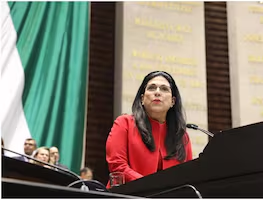Más Información

Diputada del PRI propone reforma para que servicio social cuente como experiencia laboral; insiste en hacerlo obligatorio

Ante medidas anunciadas por gobierno de EU, PAN urge plan integral; exige compartir estrategias implementadas

Siguen conversaciones con administración de Trump, dice Sheinbaum; “estamos obligados a tener una buena relación con EU”
The hospitalization of Saudi Arabia’s King Salman has sparked new rumours on the ascent to the throne of his son the Crown Prince Mohammed bin Salman , who will inherit a country full of questions about its future.
King Salman, the custodian of Islam’s holiest sites, served as governor of the Riyadh region for several decades before he was named crown prince and deputy prime minister in 2012. Three years later he took the throne from the House of Saud after the death of his half-brother Abdullah, who was 90.
Due to his health problems, including mild dementia, media reports have insisted since 2017 that the 84-year-old monarch would abdicate in favour of the de facto ruler Bin Salman, 34, better known as MBS .
This time, however, the transfer of power seems likely amid an unstable domestic and international environment, marked by the United States elections, and the crisis provoked by the falling oil prices.
According to the Royal Court, King Salman was hospitalized on Monday for inflammation of the gallbladder and is now in stable condition after he underwent a successful surgery.
On Wednesday, it was reported that he chaired a cabinet meeting from hospital. In a country characterized by the secrecy and absolutism of its rulers, nevertheless, “ Saudi Arabia watchers” are stressing that MBS would take control of the kingdom before the U.S. elections in November, or even in the next month.
The reason is simple: MBS, who betrayed his promises of liberalization and is immersed in an endless purge of rivals from the royal family, needs to tighten his grip on power due to the possible defeat of his main defender, U.S. President Donald Trump.
Despite the outrage caused by the murder of influential Saudi journalist Jamal Khashoggi back in 2018 , Trump has stood behind the young leader, who courted him with a USD $350 billion purchase of U.S. arms.
The same can be said of Saudi atrocities in Yemen, where MBS launched five years ago a disastrous invasion supported by the United Arab Emirates, Washington and other allies.
“There have been a couple of missteps,” during Bin Salman’s rule, declared to Newsweek on Monday Jared Kushner, Trump’s son-in-law and senior White House adviser, yet “they have been a very good ally.”
Last year, the CIA reportedly concluded that MBS ordered Khashoggi’s killing and dismembering inside the Saudi consulate in Istanbul, Turkey . In the same vein, United Nations Special Rapporteur Agnes Callama underscored that her inquiry showed “that there is sufficient credible evidence regarding the responsibility of the Crown Prince demanding further investigation.”
Impunity
Bin Salman’s impunity could be altered by an electoral victory of the Democratic presidential hopeful Joe Biden. At a November 2019 debate, the former U.S. Vice-president vowed to “make [Saudi] the pariah that they are,” and said there was “very little social redeeming value in the present government in Saudi Arabia.”
Biden, who is leading electoral polls, also promised to end the sale of U.S. weapons for the war in Yemen, where more than 100,000 people have died amid the worst global humanitarian catastrophe.
Bin Salman intends to become king before the G-20 summit in Riyadh scheduled for November, revealed Middle East Eye . The news website added that MBS will not wait for his father to die because King Salman’s presence gives legitimacy to him. Prior to the coronavirus pandemic, he planned to use the summit as the stage for international recognition surrounded by Trump and other major world leaders.
Founded in 1932 by King Ibn Saud , Saudi Arabia has been ruled since his death by one of his sons, with authority passing from brother to brother and sealed by family consensus. Bin Salman, not even the most senior among his own brothers, would be the first king to lack that legitimacy.
Other observers believe that the real question is who MBS will choose to be his crown prince, pointing out his brother and Deputy Defense Minister, Prince Khaled . He served as ambassador in Washington, before being called back to Riyahd due to his involvement in the Khashoggi case.
Nonetheless, his designation would breach a rule agreed by the royal family before Bin Salman’s displacement of his uncle, former Crown Prince Mohammed bin Nayef , from the line of succession. As a concession, King Salman accepted that his son would name a crown prince from a separate branch of the family, to prevent the concentration of power in Bin Salman’s circle.
Considering the great ambitions of MBS and his expected long reign, he is likely to change this rule and even decide not naming a heir in the short term. Bin Salman has already shown his disdain for traditions; he began cementing his control arresting nearly 500 princes, government ministers, and business people in 2017, after the creation of an “anti-corruption committee”.
The purge continues; Prince Ahmed bin Abdulaziz , the younger brother of King Salman, was jailed for an alleged coup attempt in March. Prince Bin Nayef, his half-brother Nawaf , and his uncle Ahmed bin Abdulaziz Al Saud were arrested and charged with treason the same day.
This month, The Washington Post affirmed that the “anti-corruption committee” was preparing additional charges against Prince Bin Nayef, for allegedly robbing USD $15 billion through a network of front companies and private accounts created to disguise covert counter-terrorism operations.
Besides the war in Yemen and the sporadic missile and drone attacks on Saudi Arabia launched by Houthi rebels, MBS will have to deal with the daunting prospect of a conflict with regional rival Iran.
During the last weeks, a series of explosions in a nuclear plant and other strategic facilities of the neighbouring nation, attributed to Israel, has proved that MBS is not the only one worried by the outcome of U.S. elections. If the Israeli Prime Minister Benjamin Netanyahu manages to trigger a war involving Washington, it would be very difficult for Riyadh to remain neutral.
Saudi Arabia’s main challenge in the short term, however, is economic recovery following the Covid-19 pandemic that has killed more than 2,600 people in the vast desert country. Riyadh’s King Faisal Specialist Hospital where King Salman was admitted this week, has been itself the subject of controversy in recent months, after it was closed to all but emergency cases due to an outbreak affecting a dozen people inside.
A statement by Finance Minister Mohammed al Jadaan warned in May that Saudi Arabia must “extremely reduce” budget expenditures and thus slashed operational and capital spending by USD $26.6 billion.
Exhausted by the oil price war with Russia earlier this year, the kingdom is incapable to finance Bin Salman’s Saudi Vision 2030 reform to reduce dependency from hydrocarbon revenues that compose 87% of public spending. NEOM, a proposed USD $500 billion smart city on the Red Sea coast, might see project implementation “stretched out over a long period,” said Ali Shihabi, a member of its advisory board.
Riyadh has already taken unprecedented measures to support its finances, including tripling value-added tax, increasing import fees, and cancelling some benefits for state workers and the large royal family .
In addition to raising debt, the government has already been selling state assets as part of its diversification program. In December, it sold a USD $29 billion holding in energy giant Saudi Aramco through the largest initial public offering in history.
The Persian Gulf kingdom “is not ruling anything away from now,” said Al Jadaan regarding the introduction of an income tax and plans to privatize assets in the education, health-care, and water sectors.
According to the International Monetary Fund (IMF), Saudi Arabia’s economy was forecast to shrink by 6.8% this year.
“The world is still living through Covid-19 and there is a lot of uncertainty around, yet I am optimistic as always,” Al Jadaan told CNBC at the conclusion of the G-20 Finance Ministers and Central Bank Governors meeting on Sunday. “Saudi Arabia has weathered an even worse oil crisis in the past and worse geopolitical situation in the past. We recovered strongly and this is not going to be an exception,” he remarked.
Editing by Sofía Danis
More by Gabriel Moyssen







